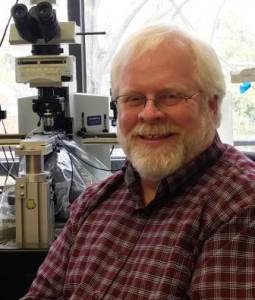School of Medicine Columbia
Faculty and Staff
David Mott, Ph.D.
| Title: | Professor |
| Department: | Pharmacology, Physiology & Neuroscience School of Medicine Columbia |
| Email: | david.mott@uscmed.sc.edu |
| Phone: | 803-216-3512 |
| Fax: | 803-216-3538 |
| Office: |
Pharmacology, Physiology & Neurology |

Education
Postdoctoral
Emory University and Duke University
Ph.D.
Duke University, Durham, NC
Research
Research in my laboratory is directed toward understanding how synaptic transmission between excitatory and inhibitory nerve cells in the brain is modified as a result of experience. We have focused on neurons in the limbic system, mostly the hippocampus. The hippocampus plays important roles in learning and memory, as well as in pathological conditions, such as epilepsy, schizophrenia and Alzheimer’s disease. We are investigating changes in synaptic transmission that occur in the hippocampus in temporal lobe epilepsy. For example, one project in the laboratory examines how changes in the function of specific excitatory glutamate receptors, called kainate receptors contribute to development of the epileptic state. Another project is aimed at defining alterations in dopamine receptor modulation of synaptic transmission in temporal lobe epilepsy. Other projects examine inhibitory synaptic transmission in epilepsy. These studies are carried out using electrophysiological, behavioral and immunological techniques as well as magnetic resonance imaging. Viral mediated gene transfer is used to manipulate the expression of specific proteins in the brain in an attempt to restore normal function in epileptic animals. We hope that by better understanding changes in the epileptic brain we can develop novel therapies to suppress epilepsy.
Publications
- Grosenbaugh, D.K. and Mott, D.D. Stiripentol is anticonvulsant by potentiating GABAergic transmission in a model of benzodiazepine-refractory status epilepticus. Neuropharmacology. In Press.
- Fisher, J.L. and Mott, D.D. (2012) The auxiliary subunits neto1 and neto2 reduce voltage-dependent inhibition of recombinant kainate receptors. Journal of Neuroscience 32: 12928-12933.
- Stanley, E.M., Fadel, J.R. and Mott, D.D. (2012) Interneuron Loss Reduces Dendritic Inhibition and GABA Release in Hippocampus of Aged Rats. Neurobiology of Aging. 33: 431.e1-13.
- Fisher, J.L. and Mott, D.D. (2011) Distinct Functional Roles of Subunits within the Heteromeric Kainate Receptor. Journal of Neuroscience. 31: 17113-17122.
- Mott DD, Dingledine R. (2011) Unraveling the role of zinc in memory. Proc Natl Acad Sci U S A. 108:3103-3104.
- Mott, D.D., Benveniste, M., and Dingledine, R.J. (2008) pH-Dependent Inhibition of Kainate Receptors by Zinc. Journal of Neuroscience. 28: 1659-1671.